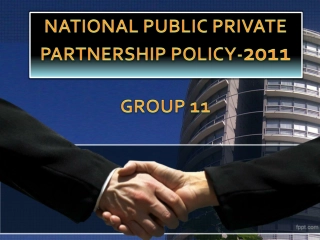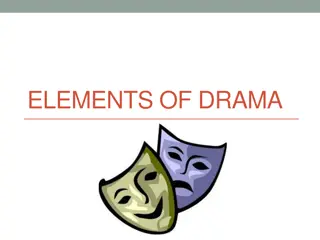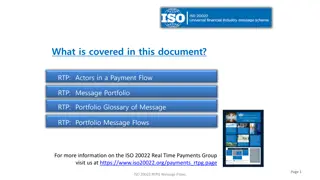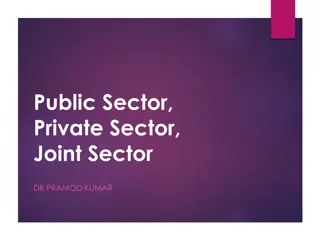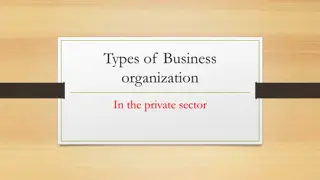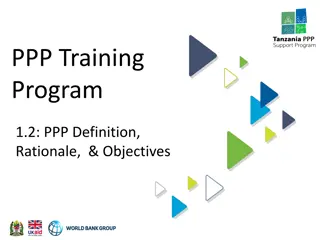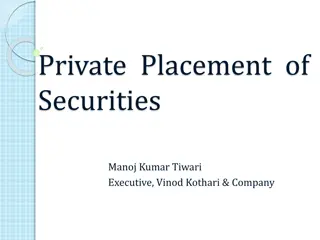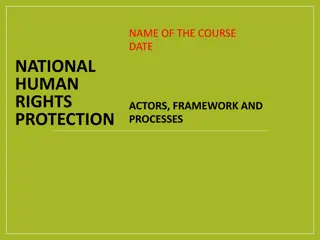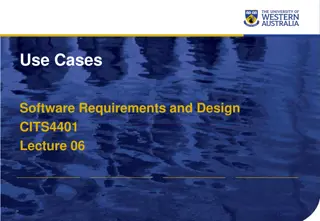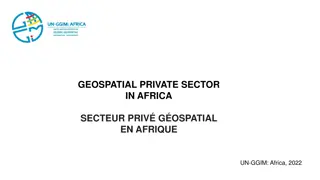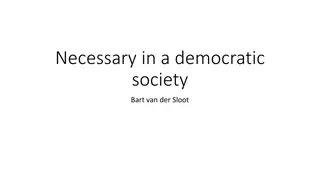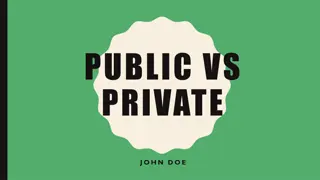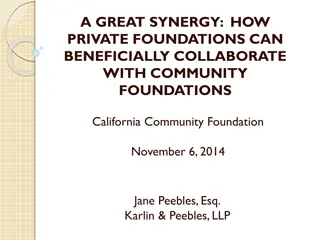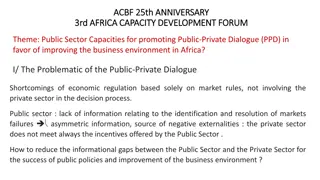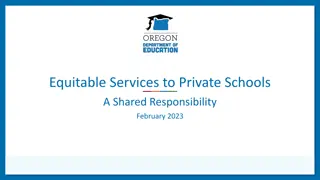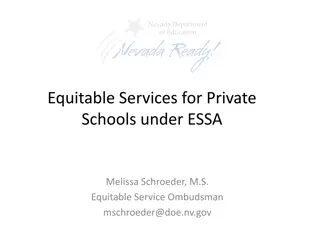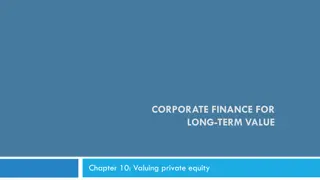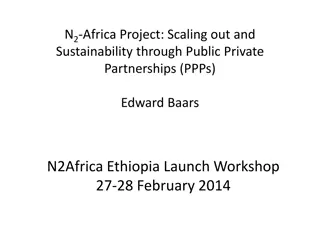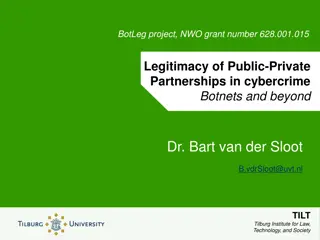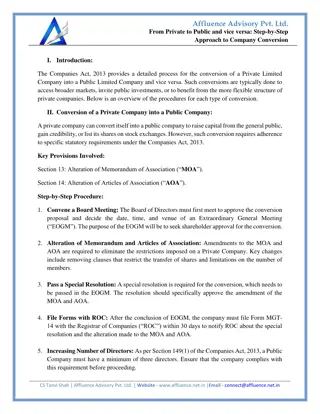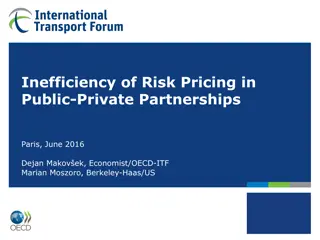National Public Private Partnership Policy 2011
An arrangement between the government and private sector for the creation of public assets or delivery of public services. This partnership focuses on harnessing private sector efficiencies, innovation, and technological improvements to provide affordable and improved services. Investments are made
5 views • 25 slides
Contrasting Public Finance and Private Finance
Public finance involves the income and expenditure of governmental bodies, focusing on societal welfare, compulsory nature, coercive revenue collection, and long-term welfare objectives. In contrast, private finance pertains to individual financial operations, voluntary nature, income adjustments to
9 views • 42 slides
Understanding the Elements of Drama and Theater History
Drama, originating from the Greek verb "dran," involves acting and storytelling in front of an audience. Explore the key aspects, from the Globe Theater in London to dramatic structure, actors, and speech forms like dialogue and monologue. Learn about the crucial components such as playwrights, acto
4 views • 22 slides
Promoting Private Sector Engagement in Local Governance through PPPs in Zambia
This presentation outlines the promotion of private sector engagement in local governance in Zambia through Public-Private Partnerships (PPPs). It covers the legal and institutional frameworks, processes, sub-national level PPP projects, current initiatives, lessons learned, and conclusions. The ove
2 views • 23 slides
Private Security Training: Law, Regulations, and Civil Liability
Covering a range of essential topics, this training presentation delves into private security regulations, civil law torts, limited authority of private citizens, citizens' arrests, and the role of private security professionals as agents of law enforcement. Understanding these concepts is crucial f
3 views • 36 slides
Everything You Need to Know About Hiring a Private Chef
\"Everything You Need to Know About Hiring a Private Chef\" offers comprehensive insights into the private chef hire process. Discover how to find the perfect chef for your culinary needs, what to expect in terms of services and costs, and tips for ensuring a memorable dining experience. Elevate you
0 views • 9 slides
Real-Time Payments: Actors and Message Flows Overview
This document provides an overview of the actors involved in a payment flow and the message portfolio in Real-Time Payments (RTP). It includes details on various actors like Instructing agent, Forwarding agent, Ultimate Debtor, Reimbursement agents, and more. The provided message flows illustrate th
1 views • 12 slides
Introduction to Public Key Cryptography
Public key cryptography, exemplified by algorithms like Diffie-Hellman and RSA, revolutionizes secure communication by allowing users to encrypt messages with public keys known to all and decrypt them with private keys known only to the intended recipient. This advanced encryption method ensures sec
1 views • 44 slides
Understanding Different Types of Companies in Business
Explore the various kinds of companies in the business world, including statutory companies, registered companies, private companies, public companies, and more. Learn about the differences between private and public companies, statutory company examples like LIC and RBI, and the characteristics of
0 views • 25 slides
Understanding Public and Private Sectors in the Economy
The public sector, private sector, and joint sector play crucial roles in the economy. Public sector includes government services and enterprises, while private sector focuses on profit-making activities. Private sector contributes significantly to national income, generates employment, and ensures
0 views • 20 slides
Overview of Business Organization in the Private Sector
Explore the types of business organizations in the private sector, including sole traders, partnerships, private limited companies, public limited companies, franchises, and joint ventures. Learn about the distinctions between public and private sector organizations, reasons for choosing different b
0 views • 22 slides
Understanding Public-Private Partnerships (PPPs)
Public-Private Partnerships (PPPs) involve collaborations between public and private entities to deliver infrastructure and services. This training program delves into the definition, rationale, and objectives of PPPs, highlighting the various components, characteristics, and key considerations invo
2 views • 35 slides
Enhancing E-Waste Recycling Through Public-Private Partnerships
Public-Private Partnerships (PPPs) offer a promising approach for e-waste recycling, addressing challenges such as cost sustainability and knowledge gaps. This model leverages the strengths of both the public and private sectors, improving operational efficiency, access to new markets, and the integ
0 views • 11 slides
Private School Children with Disabilities - U.S. Department of Education Updates
U.S. Department of Education's Office of Special Education Programs has implemented new regulations and key changes regarding children with disabilities enrolled in private schools. The changes include responsibilities of local educational agencies, consent requirements, and clarification on due pro
2 views • 26 slides
Financial Services Institutions Support Value Chain Actors
Financial services institutions play a vital role in supporting various actors within the value chain, including exporters, wholesalers, banks, processors, and non-bank financial institutions. This ecosystem also involves technical training, business support, local traders, private investors, specia
0 views • 30 slides
The Case for Private Credit Investments in the Global Market
Private credit investments are gaining significance in the global market, offering innovative financing solutions outside traditional avenues like public markets. With a focus on innovation, independence, and integrity, private credit investments cater to diverse sectors such as real estate, natural
1 views • 9 slides
Private Placement of Securities: Overview and Methods to Raise Capital
Private placement of securities involves offering securities to a select group of investors by a company, excluding public offering. This presentation covers the meaning of private placement, provisions of law, methods to raise capital through private placement, and understanding the Private Placeme
3 views • 16 slides
Private Schools: CARES Act Equitable Services Overview
This session introduces and discusses the implications of the CARES Act Equitable Services for private schools, including a timeline of events, court decisions, and implications for districts and private schools. The presentation covers the requirement for LEAs to provide equitable services to non-p
2 views • 12 slides
Understanding National Human Rights Protection Systems
Explore the essential elements of national human rights protection systems including actors, frameworks, and processes. Learn about the foundational role of the state, legal frameworks, institutions, and the involvement of non-state actors in upholding human rights. Reflect on the importance of dome
0 views • 35 slides
Understanding UML Use Cases for Software Requirements and Design
Use cases play a crucial role in defining software requirements and design. They outline interactions between actors and the system, describing functional requirements from the user's perspective. Identifying actors, their interactions, and goals are essential when writing a use case. This process h
0 views • 24 slides
Overview of US Foreign Policy Decision-Making Process
The US foreign policy decision-making process involves various actors and dynamics such as the President, Congress, interest groups, media, and public opinion. The Constitution outlines key provisions related to war powers, treaties, and appointments. The balance of power between the branches influe
2 views • 15 slides
Enhancing Private Sector Engagement in GEF Projects Towards Sustainable Development
Expanding private sector engagement in GEF projects is crucial for leveraging funding, expertise, innovation, and technology transfer. Through partnerships with various private sector actors, GEF aims to address environmental challenges effectively and promote sustainable business models. Reflection
2 views • 13 slides
Geospatial Private Sector in Africa: Opportunities and Challenges
The geospatial private sector in Africa faces challenges due to its small and disjointed nature, with a focus mainly on multinational corporations. Initiatives like UN-GGIM are encouraging private sector participation at national and continental levels. Efforts are being made to include the private
0 views • 6 slides
Understanding Public Goods in Higher Education
This text delves into the concept of public goods in higher education, examining the distinctions between public and private forms, the economic and political dimensions, and the normative value of public goods. It discusses the economic definition of public goods, emphasizing their non-rivalrous an
1 views • 18 slides
Necessity Test in a Democratic Society: Balancing Public vs Private Interests
The necessity test in a democratic society involves balancing public interests such as security, morality, and environment against private interests. The test determines whether an infringement is necessary and legitimate, or unnecessary and a violation. Different categories like security-related ca
0 views • 36 slides
Understanding Public and Private Spaces and Behaviors
Exploring the concept of public versus private spaces, behaviors, and activities through examples such as public places like restaurants and schools, as well as private places like bedrooms and medical offices. The content also delves into public behaviors like shaking hands and talking to people, c
0 views • 7 slides
Engaging Key Actors in Climate Information Value Chain Through Radio Discussions
In this discussion, the importance of engaging key actors along the climate information value chain through radio discussions is emphasized. The symbiotic relationship between radio journalists and meteorological authorities is highlighted, as well as the key actors involved such as Government Agenc
0 views • 22 slides
The Vital Role of Religious Institutions in Supporting Immigrants
Religions and immigration are interlinked in modern societies, where religions play a significant role in providing services, defending rights, and supporting the social cohesion of immigrants. Mainstream religious institutions serve as key actors in offering assistance, advocating for migrant right
2 views • 14 slides
Private Foundations: Advantages, Benefits, and Collaborations
Explore the benefits of private foundations, including control over grant-making, donor recognition, tax advantages, and collaboration possibilities with community foundations. Understand the differences between private foundations and donor-advised funds, the formation of private family foundations
0 views • 72 slides
Understanding Use Cases and Actors in System Design
Explore the concept of use cases in system design, including user goals versus interactions, system boundaries, actors, and how they all come together in use case diagrams. Learn how use cases capture user-visible functions, achieve discrete goals, and represent the interactions between actors and t
0 views • 20 slides
Enhancing Public-Private Dialogue for Development in Africa
Addressing the shortcomings in public-private dialogue can lead to improved business environments in Africa. The challenges include information gaps, lack of involvement of the private sector in decision-making, and issues with economic regulation. Successful examples like the Cameroon Business Foru
0 views • 5 slides
Equitable Services to Private Schools: Shared Responsibility and Requirements
Equitable services to private schools involve federal programs supported by tax dollars, allowing all children and teachers access to various educational programs. Private schools must be not-for-profit to qualify. Consultation plays a crucial role in reaching agreements on providing equitable and e
0 views • 17 slides
Understanding Equitable Services for Private Schools under ESSA
Equitable Services for Private Schools under ESSA ensures fair educational benefits for private school children, teachers, and personnel compared to public schools. Requirements cover various programs like Title I and Title IV, with an ombudsman role to enforce compliance. ESSA mandates separate pro
0 views • 29 slides
Understanding Private Equity Fundamentals for Long-Term Value Creation
Private equity presents a compelling alternative to public equity, emphasizing active ownership and long-term value creation. This involves investing in non-traded equity stakes in private companies with the goal of enhancing performance and attaining profitability upon exit. Formal and informal pri
0 views • 18 slides
Enhancing Sustainability in Agriculture through Public-Private Partnerships (PPPs)
This project focuses on scaling out and ensuring sustainability in agriculture through the establishment of Public-Private Partnerships (PPPs). Key activities include institutionalizing new technologies, fostering long-term sustainability of supply chains, and enhancing farmer access to profitable l
0 views • 10 slides
Exploring Legitimacy and Public-Private Partnerships in Cybercrime Enforcement
Investigate the legitimacy of public-private partnerships in addressing cybercrime, focusing on botnets and related issues. The study examines the classic model of legitimacy involving the state, citizens, and the market, and explores different stakeholders' roles in ensuring legitimacy in enforceme
0 views • 14 slides
Insights from Public Police Executives on Private Security Services
This survey conducted by the FSU Policing, Security Technology and Private Security Research & Policy Institute gathered opinions from 68 public police executives on private security services. The executives shared anticipation of future expansions, factors influencing growth, types of private secur
0 views • 9 slides
Company Conversion from Private to Public and vice versa-Step-by-Step Approach
The Companies Act, 2013 outlines the process for converting a Private Limited Company into a Public Limited Company and vice versa. Conversion from private to public allows access to wider capital markets and increased credibility, while the reverse
1 views • 4 slides
Inefficiency of Risk Pricing in Public-Private Partnerships
This discussion focuses on the inefficiency of risk pricing in Public-Private Partnerships (PPPs) and the implications for taxpayers. The analysis covers why PPP risk pricing is a critical topic, the costs of transferring risks to private parties, when risk pricing is considered efficient, and the r
0 views • 17 slides
The Role of Public Goods in Higher Education
This paper discusses the concept of public goods in higher education, exploring how they are defined, observed, and improved. It analyzes the distinctions between public and private goods based on economic and juridical-political factors, and examines the significance of public goods in advancing so
0 views • 19 slides
